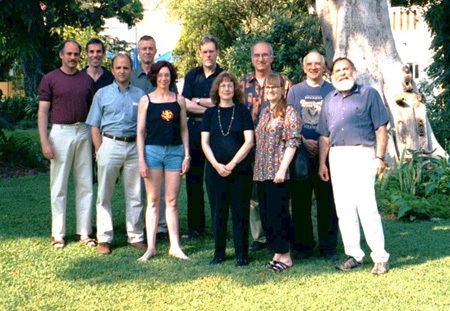Hearing Cultures: New Directions in the Anthropology of Sound
Date
Apr 24-28, 2002Organized by
Veit ErlmannLocation
Hacienda de Los Laureles, Oaxaca, MexicoPublications
Hearing Cultures: Essays on Sound, Listening and Modernity (Veit Erlmann, Ed.), Berg, Oxford, 2004.Participants
- Linda Austern Northwestern University, USA
- Michael Bull University of Sussex, UK
- Paul Carter University of Melbourne, Australia
- Steven Connor University of London, UK
- Veit Erlmann University of Texas, USA
- Penélope Gouk University of Manchester, UK
- Charles Hirschkind University of California, Berkeley, USA
- Douglas Kahn University of California, Davis, USA
- Manis B. Nuckolls University of Alabama, USA
- Hillel Schwartz Independent Scholar, USA
- Anthony Seeger University of California, Los Angeles, USA
- Bruce R. Smith University of Southern California, USA
- Emily Thompson Massachusetts Institute of Technology, USA
ORGANIZER’S STATEMENT: Anthropology, for the past two decades, has been dominated by what has been variously called the “textual turn,” “interpretive approach” or “hermeneutics.” According to these approaches, anthropology’s primary concern is with action as discourse. Culture is said to be a web of practices into which are inscribed meanings in much the same way as writing fixes meaning in a text. Consequently, to understand culture is to be able to read it. Amid this frenzy of the “text,” scholars are only now beginning to consider the fact that culture also, and perhaps even more fundamentally so, involves sensation, emotion, bodily experience. And although the upsurge of critical discourses centered on the body has not completely bypassed the field, still few are those anthropologists who challenge the prevailing emphasis in the social sciences and humanities on representational practices associated with the visual-objects, locations, structures, configurations. The bodies studied by anthropologists may begin to look more like those of real human beings making full use of their senses, but more often than not these bodies are also lacking a crucial sense organ: the ear.
The main goal of the conference was to audit the meanings, parctices and discourses pertaining to sound as culture. The outcome of the conference will do more than prompt a rethinking of current text-centered anthropological theory. By crossing numerous disciplinary boundaries, by opening up new, unreleased or otherwise underused bodies of material, and by examining sound from a crosscultural perspective, I am also expecting the conference to unsettle ingrained conceptions of sound in the West, sustain a dialogue with alternative sonic practices and thus ultimately challenge many taken-for-granted notions underlying contemporary theories of culture.
Wenner-Gren Symposium #129
